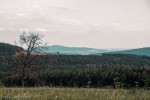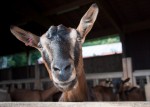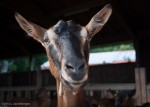I’m not sure what the term “Alp” originally meant. I tend to think of the term as referring to really tall mountain peaks, like the ones in Austria, Switzerland or Italy. So it’s always been surprising to me that the hills that are not too far away from Tübingen are called the Schwabian Alps.
We can see them off in the distance when we’re up high enough in town, and we did manage once to visit a castle that sits on top of one of the hills. But that’s all we’d ever really seen of the Schwabian Alps until we went exploring with some friends this past Saturday.
Chris commented that overall these Alps reminded him of places he went to in Vermont as a child: mile after mile of rolling hills covered in farmland. One of the places we went to was a farm that raises goats to produce goat cheese. On Saturday afternoons they have a little cafe and bakery where, in addition to the cheese, you can also buy a cup of coffee and a piece of homemade cake to enjoy while overlooking the hillside.
Oh, and you can also go say hi to the goats. While the view of the hillside is nice, I think that one of the goats was slightly more photogenic on Saturday.
See what you think. 😉
- On a hillside in the Schwabian Alps
- On a hillside in the Schwabian Alps Photo #2
- Pick me! Pick me!
- Ready for my closeup – #1
- Ready for my closeup – #2






That goat really likes his close up. In No. 2 he appears to be smiling. Sure he isn’t part ham?
I agree with Pat. The scenery is lovely, but the goat steals the show.
Now that you’ve raised the question of the etymology of “Alps,” your faithful readers are eager for an answer. And while you’re at it, would you mind tackling “Swabian” as well?
Thanks – I agree with both of you that the goat was the definitely the star of the show, mugging for the camera.
Will, I raised the question with my in-house linguist, and his folk etymology is that “Alps” must be related to the Latin stem “alb”, meaning “white”, used to name the mountains because they are often snow-covered. It’s a cute folk etymology, but I’m not sure I’d quote him on it – beyond using it on a blog, of course. 😉 The Schwabian Alps are not often snow-covered, so I’m not sure if that really clears up why those hills use the same term.
Re Swabian: Well, it’s the Schwabian Alps because the region we live in was historically called Schwabia. According to Wikipedia, Schwabia was one of the 10 circles of the Holy Roman Empire until the dissolution of the empire in 1806. More information can be found in the entry here: http://en.wikipedia.org/wiki/Swabia.
Note that the German spelling has the initial “sch”; since I’m writing in English, I guess I should switch and use the English spelling, Swabia, as you and Wikipedia use. 🙂
Most illuminating, though for Alps the OED notes that the Romans called them Alpes, which they’d have had no reason to do if the root were alb.
But this is the Web, where folk etymology should be nurtured, not squelched.
Hmmm, any ideas about where “squelch” comes from? … Never mind!